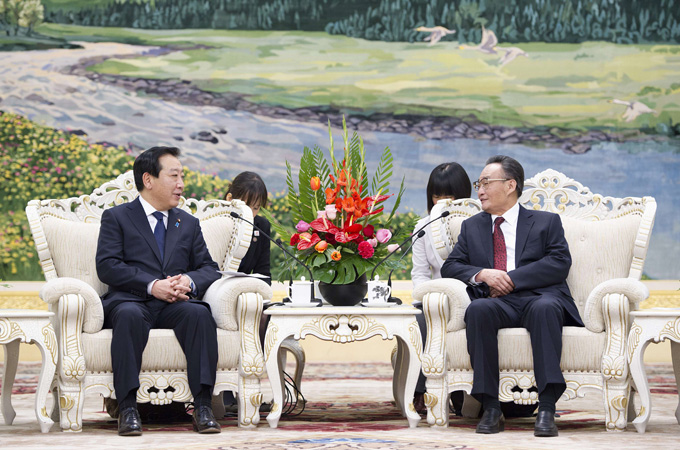North Korea dominates China-Japan talks
Chinese president asked to share information about developments in one-party state in the wake of its leader’s death.

 |
| Noda, at left, is the first regional leader to visit Beijing since the death of the North Korean leader a week ago [Reuters] |
Japan has urged China to shoulder a big role in ensuring that North Korea avoids volatile moves, despite uncertainties created by the death of that country’s leader, Kim Jong-il.
During a meeting in Beijing on Monday, Yoshihiko Noda, the Japanese prime minister, asked the Chinese president, Hu Jintao, to share information about developments in North Korea, where the succession of Kim’s youngest son, Kim Jong-un, has led to speculation about who will control the one-party state and its nuclear weapons programme.
China has sought to defuse tensions in the region by hosting six-party nuclear-disarmament talks since August 2003. The now-stalled negotiations bring together North and South Korea, China, the US, Japan and Russia.
“It is important that we will not let the death of the chairman of the National Defence Commission Kim have a negative impact on the peace and stability of the Korean peninsula,” Noda was quoted by a Japanese official as telling Hu in Beijing.
Kim Jong-il’s many titles included head of the military.
‘Big influence’
Noda is the first regional leader to visit the Chinese capital since Kim Jong-il’s death on December 17 was announced, putting Kim Jong-un in formal charge of a country which has long relied on China for diplomatic and economic support.
“Under these circumstance, the role of China, which is the chair country of the six-party talks and has a big influence on North Korea, is extremely important,” Noda said.
“I would like vigorous information sharing between Japan and China, and intend to address the situation calmly and properly.”
North Korea has conducted two plutonium-based nuclear test blasts, a succession of military altercations, and has declared that it is developing uranium enrichment, which could open another path to assembling atomic weapons.
In April 2009, North Korea said it was quitting the six-party talks and reversing nuclear “disablement” steps, unhappy with implementation of an initial disarmament deal.
“Both sides agreed that preserving the peace and stability of the Korean peninsula serves the interests of all sides,” the Chinese foreign ministry said in its account of the first day’s talks between Noda and Wen on Sunday.
In a separate announcement at Monday’s meeting in Beijing, the Chinese and Japanese governments said they would encourage use of their own currencies in bilateral trade, which at present is conducted mostly in US dollars.
|
|
They also agreed to support the sale of bonds denominated in China’s yuan by Japanese companies in Tokyo and foreign markets and by the state-owned Japan Bank of International Co-operation in mainland China’s markets, which are closed to most foreign investors.
“To support the growing economic and financial ties between China and Japan, the leaders of China and Japan have agreed to enhance mutual co-operation in financial markets of both countries and encourage financial transactions between the two countries,” the governments said in identically worded statements.
Al Jazeera’s Melissa Chan, reporting from Beijing, said it was no major surprise that the two countries would come up with such a decision.
“To a certain extent it is expected, because not only is China the largest holder of US bonds but also, not too long ago, Japan was the largest holder,” she said.
Similar situation
Our correspondent said both countries were now in the same situation of wanting to diversify their bond holdings.
China and Japan have looked to purchase European bonds, but given the state of the the continent’s economy, it is a welcome development for the Japanese that the Chinese are willing to let them purchase Chinese bonds, she said.
“What is also particularly interesting about the discussions that have taken place is the fact that these two countries have decided to start talking about the possibility of having a free-trade agreement next year,” Al Jazeera’s Chan said.
“The largest trading partner that Japan has is China, despite the political differences that we’ve seen over the past couple of years.”
The Chinese and Japanese governments gave no timetable for practical steps to put the promises into action or the size of possible bond offerings.
Nevertheless, the pledges were a striking step for China and Japan, which are the world’s second- and third-largest economies and are bound by billions of dollars in trade.